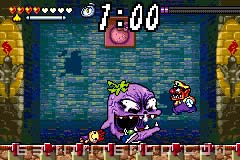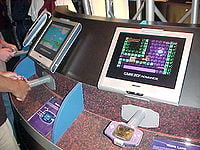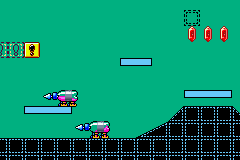List of Wario Land 4 pre-release and unused content
This is a list of pre-release and unused content for the game Wario Land 4.
Early builds[edit]
E3 2001[edit]
The first screenshots of Wario Land 4 were revealed at E3 2001. They show several differences to the final game.
Charts[edit]
A difference seen in all of the gameplay screenshots is the Heart Gauge. It was shorter and had a garlic icon next to it, implying that Wario originally had to collect garlic rather than little hearts to recover his Heart Meter. Furthermore, unfilled parts of the Heart Gauge were not segmented and filled parts appeared in green rather than red. Unlike in the final game, the Heart Gauge was also seen during boss fights. At least in the final version, little hearts do not appear during boss fights, making the Heart Gauge obsolete in those parts of the game.
The energy meter of bosses was different as well. While the meter's color changes depending on the boss's remaining hit points (high, middle or low) in the final version, it originally appeared in three different colors from the start, which labeled a high, middle and low amount of hit points each. The meter was also not generally segmented, but only the currently highest of its three differently colored parts. For example, if the boss still had a high amount of hit points, only the green part of its energy meter was segmented. Another difference is that a horizontal black line was in the center of the energy meter's unfilled parts.
Levels and Enemies[edit]

- In the level Hotel Horror, the lights originally had no faces.
- The Mayubirds of the level Arabian Night had four fangs rather than two in a pre-release version.
- The room of the first boss, Spoiled Rotten, did originally neither contain the TV set with the two Nintendo GameCubes nor the kitchen equipment in the background. Spoiled Rotten also had shorter teeth, no tongue and shorter leafs during its angry form. The white parts of its doll were yellow.
- During the fight against the boss Cractus, Hotaru already appeared at the beginning, while it is only seen in the final game when Wario has been turned into Zombie Wario. The two ladders in the room were not found, and plants of unknown purpose were hanging from the ceiling instead. The screen-shot also does not show the timer. It did possibly not start until Wario cracked Cractus's plant pot. A more minor difference is that the ground of the room didn't have the indentations in its center like in the final version.
When Wario rams a block, there will be a different distribution of rubble.
The Utsuboankō have a larger mouth
The Beezleys are of a slightly different color
A pre-release version of the fight with Cractus.
The pistons light up at a different stage in height
Snowman Wario and the Yeti both have a different appearance from the final game
The enemy Mayubird has four fangs rather than two
The boulders thrown by Bowlers are of a slightly different appearance, and the lava has a different color scheme
Monsoon Jungle: the Tobawani have a slightly different appearance.
Crescent Moon Village: Zombie Wario has a different palette design.
Unused Data[edit]
A small room was removed from the end of the level Palm Tree Paradise. It would have been accessible by ramming the wall behind the switch. The room itself has programmed sprite layouts for each game mode. Normal mode includes a single Totsumen with a Diamond at the end. The number of enemies increases to five on S-hard mode, and the Giant Diamond is removed.
Unused area in Palm Tree Paradise
Debug Level[edit]
Before creating full levels, the game's developers prepared a simple debug level with lots of different obstacles. This area allowed them to test Wario's moves and abilities as they were programmed, to prevent future problems with gameplay. The level itself is quite simple in design, with a blue background, and black blocks with dotted outlines for flooring. Several slopes, blocks of varying sizes, coins and enemies are found throughout the level. Wire mesh can be seen in some rooms as part of the background. Many doors are also included to move between different rooms.
Graphics[edit]
The Wario Hop contains graphics for what appears to be the seagull being killed or knocked out.[2]
Various levels also have unused tiles not found in the finished game stored in their level data. These include a very early design for the windows and doors in Crescent Moon Village, a foreground grate tile meant for the sewer sections in the same level and a skull meant to be embedded in the walls of Hotel Horror as a hint that certain walls could be broken or walked through.[3]
Music[edit]
In the last level, Golden Passage, the player inevitably lands on the switch upon entering the level, regardless of the Game Mode. So in result, the switch music plays throughout the whole level. But if the player uses a hacking device such as an Action Replay, to avoid stepping on the switch, a hidden soundtrack plays which can not be heard in normal gameplay. It can be heard at reduced volume by pausing the game before Wario steps on the switch.
| File info 0:30 |
Options[edit]
Within the graphics of the 'all bosses will be revived' message screen, there's a mention of 'Intense Mode'. It is likely that this either refers to an early name for Super Hard mode or another scrapped difficulty level beyond it.[4]
Language Selection[edit]
An option to select English or Japanese similar to Wario Land 3 was planned. Graphics for it remain in the game. Both game versions contain the actual data used by each language, which can be loaded using a hacking device.
Gallery[edit]
Wario originally needed a key to unlock a jewel piece box.
Unused sprite of the shop owner. The skateboard would later be used as 9-Volt's skateboard in WarioWare, Inc.: Mega Microgame$!
Unused area logo of a Game Corner. This was renamed to the Mini-Game Shop in the final game.
References[edit]
- ^ Early, unused logo seen on the official E3 2001 gamepage
- ^ CM30. Wario Land 4. TCRF. Retrieved July 23rd 2016.
- ^ CM30. More Beta Content and Tiles Have Been Found in Wario Land 4!. Gaming Reinvented. Retrieved August 1st 2018
- ^ CM30. Unused Intense Mode Graphics. Wario Forums. Retrieved July 8th 2016.















